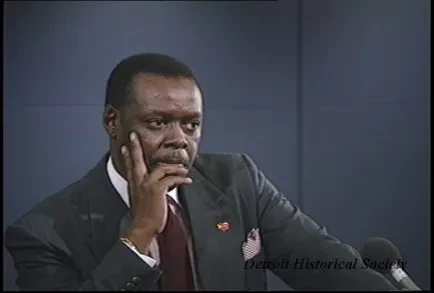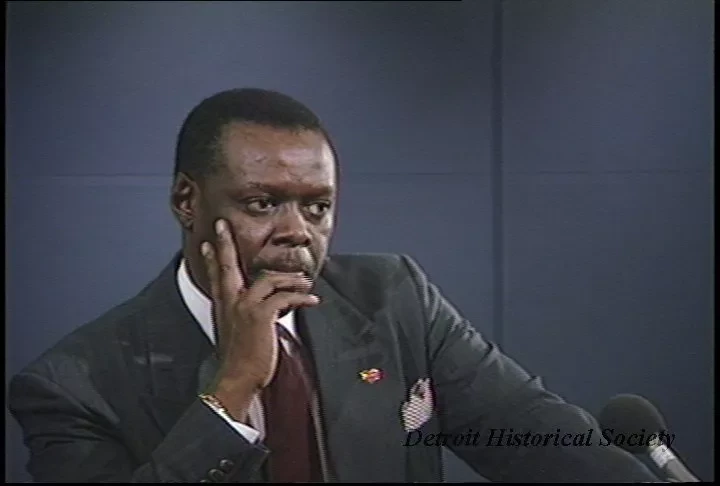U-Matic
Major Crime Press Conf
02 08 93
U-Matic S tape containing footage shot at the February 8, 1993 press conference announcing the latest statistics on major crimes in the city. The press conference is hosted by Charlie Williams, the Chief Executive Assistant to Mayor Coleman A. Young, who stands in for the absent mayor. Williams, Chief Stanley Knox, Executive Deputy Chief James Bannon, and Inspector Benny Napoleon all address the audience during the course of the event. The press conference is followed by brief footage from a speech given by an unidentified man about the economic problems facing cities and their residents.
Williams opens the press conference by stating that he did not ask questions when the major asked him to host the press conference, and that he has no other statements on the matter. He then introduces all of the representatives of the Detroit Police Department present, as the camera pans around to show them. Chief of Police Stanley Knox, Executive Deputy Chief James Bannon, Deputy Chief Mary Jarrett-Jackson (in charge of Western operations), Deputy Chief James Younger (head of the Criminal Investigation Bureau), Deputy Chief Francis Allen (in charge of the Administration and Professional Services Bureau), Deputy Chief Revel Brawner (in charge of the Management Services Bureau), Commander Rudy Thomas (head of the Narcotics Division), Inspector Benny Napoleon (head of the Gang Squad), and Inspector Gerald Stewart (head of the Major Crimes Division) are present. Williams then adds that Inspector John Henry, who is in charge of eastern operations, is absent because of family business.
Williams then reads from a prepared statement explaining how the statistics for major crimes have decreased. He cites increased community involvement as a contributing factory and invokes the "Drop a Dime on Crime" hotline. He also notes that the decrease in crime happened despite reduced staffing of the police department. He then lists statistics and recent accomplishments specific to the Narcotics Division, and Gang Squad. He also talks briefly about recent effort to curb truancy, security sweeps of schools for firearms, and the use of wanted posters.
Williams then begins entertaining questions from the press. He again stresses the importance of community involvement. Chief Knox takes to the podium to further expound on these programs, including the Drop a Dime on Crime, 224-GUNS, and 224-GANG hotlines, and the Unbeatable Team out-reach campaign, as well as the nature of the s. From his seat, Bannon chimes in that the department does not prefer per capita statistics as they do not account for the large numbers of non-residents who regularly come and go from the city.
Williams then responds to a question about juvenile crime by reading a separate set of juvenile statistics from the report. One of the reporters follows up the juvenile statistics with a question about "rap culture" and its influence on young people. Williams responds by talking about youth outreach programs like the cadet program, the Police Athletic League, and the Explorer program. A reporter then asks about Detroit's gang problem in comparison to other cities like Los Angeles. Williams stresses that there is not comparison between Detroit and L.A. in terms of gang violence. When pushed to respond to the question of which aspect of the statistics is the most troubling, Williams expands from the idea that all crimes are troubling to state that the mayor is especially focused on the matter of guns. When asked about the mayor's health, Williams says Young "feels great." Williams then discusses the impact of the perception of crime regardless of statistics, and mentions the media's role in reporting these improvements.
Knox then comes to the podium to address a question about morale in the department.
Williams returns to the podium to discuss Young's approach to the gun issue. He talks about Young's concern with observing civil rights, and the involvement of lawyers in the process. A reporter then asked about the same day release of juveniles picked for serious crimes by police, and how that might dissuade people from calling in tips on them. Benny Napoleon comes to the podium to discuss how the department is working with the Wayne County Prosecutor who in term is in contact with judges to push for stricter bonds and sentences. He also cites an instance of a juvenile being charged as an adult as a counterpoint. A reporter then asks Napoleon about complaints by residents of Southwest Detroit concerning gang violence. He responds by talking about community involvement efforts, and the various hotlines.
Williams returns to the podium to then briefly answer a question about federal support for summer job programs for young people. While a reporter is asking Williams about sensitivity training for police officers, the recording ends.
The remainder of the tape contains an earlier recording of a presentation by an unidentified man at another occasion, possibly the NAACP's 1992 Fight For Freedom Fund Dinner in Cobo Hall. He stands behind a Civic Center podium, with Deputy Mayor Adam Shakoor seated behind a banquet table to the left. In the portion captured on the tape, the speaker discusses statistics demonstrating the economic challenges faced by residents of modern cities, and mentions his experiences with students at Cleveland, Ohio's East Technical High School.
The recordings are on a 3M UCA-30S U-Matic S tape with a handwritten City of Detroit Department of Public Information Video Production label on its top. The tape is housed with a black plastic latching case with a matching label on its cover.
Request Image

